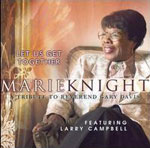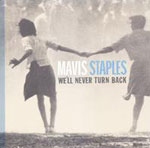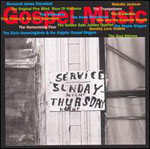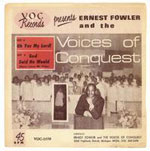Marie Knight – Let Us Get Together: A Tribute to Reverend Gary Davis, MC
 She’s best known as Sister Rosetta Tharpe’s singing partner, but Marie Knight was a seasoned vet long before the two teamed up in 1947.
She’s best known as Sister Rosetta Tharpe’s singing partner, but Marie Knight was a seasoned vet long before the two teamed up in 1947.
At five years old she was a featured soloist with the Church of God in Christ, and by her early teens she was appearing at revival meetings across the country. The itinerant life continued after she married a traveling evangelist, and by the time Tharpe first saw her, Knight – still only 19 years old – was a featured singer with Mahalia Jackson.
Tharpe’s energetic singing and guitar playing had already made her a popular solo attraction, but once she began working with Knight – whose contralto was a perfect match for her soprano – their fame spread even further.
The duo’s repertoire was strictly gospel, but boisterous performances such as ‘Didn’t It Rain’ and ‘Up Above My Head’ became popular sellers with both gospel and secular audiences. They disbanding to focus on their solo careers in the late 50s – although there would be frequent reunions.
As a soloist, Knight began to include R & B in her repertoire. At one point, she even recorded a duet with heavyweight boxing champ Jersey J. Walcott. For the most part, however, she stuck with gospel.
She toured the world many times over, and in 1973 was ordained an evangelist for the Gates of Prayer in New York – a position she still holds today.
Knight hadn’t recorded in almost twenty years before her guest appearance in 2002, on Shout, Sister, Shout, a tribute disc to Tharpe – for which she reprised ‘Didn’t It Rain.’
The producers were amazed the strength of her voice, and convinced her to record an entire album on her own. Rather than redo songs from her past, she tackled the songbook of Rev. Gary Davis.
The two shared much in common, and the combination certainly makes sense; yet until recently, Knight was unaware of Davis’ music.
Both were based out of New York and played gospel – with the occasional foray into secular material – but Davis and Knight traveled in entirely different circles.
Davis was playing on Harlem street corners while Knight and Tharpe were drawing thousands of fans to their revved-up gospel boogie shows (one performance at Griffith Stadium in Washington was attended by 27,000 fans).
Davis, an ordained minister, first recorded in 1935 – but avoided the studio for the next two decades after he realized he was being taken advantage of financially.
He played the Piedmont fingerstyle guitar blues, a ragtime derivation more intricate and syncopated than the driving Mississippi Delta blues. His influence on subsequent generations was considerable, with Bob Dylan, the Rolling Stones, Grateful Dead and Peter, Paul & Mary all recording his songs.
Many of his most well known – including ‘Samson and Delilah, Death Don’t Have No Mercy’ and ‘You Got To Move’ – appear on Let Us Get Together.
The album is produced by guitarist Larry Campbell, who has played with Bob Dylan, Paul Simon, Elvis Costello and the Dixie Hummingbirds. He’s perfect for this project; as a long-time Davis aficionado, he understands the style implicitly.
For the most part accompaniment is just acoustic guitar- with occasional guest like Kim Wilson of the Fabulous Thunderbirds on harp. The handful of band tracks are understated, and always in support of the song.
Sharing her faith with a vigorous delivery that would be do a woman half her age proud, Knight is in remarkably strong voice for a woman in her 80s.
The disc includes a quicktime video of which Knight discusses the album and her own history.
Mavis Staples – We’ll Never Turn Back, Anti
 Mavis Staples is about as close as one can get to royalty in the music business. She’s a member of the Rock and Roll Hall of Fame and a recipient of a Grammy Lifetime Achievement award. Last November, she was presented with the Americana Music Association’s Spirit of Americana Free Speech Award in recognition of her longstanding efforts within the civil rights movement.
Mavis Staples is about as close as one can get to royalty in the music business. She’s a member of the Rock and Roll Hall of Fame and a recipient of a Grammy Lifetime Achievement award. Last November, she was presented with the Americana Music Association’s Spirit of Americana Free Speech Award in recognition of her longstanding efforts within the civil rights movement.
As lead vocalist for the Staple Singers, she performed alongside her father, sisters and brother, garnering widespread acceptance both inside and outside the church. Hits like ‘Respect Yourself’ and ‘Why? (Am I Treated So Bad)’ managed to bring gospel sensibility to the pop charts. Her unique singing style mixed the spiritual, social, and sensual together. It’s no surprise Bob Dylan once asked her to marry him.
For their first decade and a half, the Staple’s repertoire was strictly gospel. That changed in 1963, after they met Rev. Martin Luther King. During a visit to King’s home church in Montgomery, Alabama, they saw how he used scripture to determine his position in the civil rights struggle. Impressed, they began incorporating ‘freedom songs’ into their repertoire, reasoning, as Pops put it; “if he can preach it, we can sing it.”
They were immediately thrust onto the frontlines of the civil rights movement. They certainly walked the talk; in 1965 the entire group was jailed after angering a racist cop in Memphis.
We’ll Never Turn Back revisits and updates the struggle. There are gospel standards like ‘This Little Light of Mine,’ and ‘We Shall Not Be Moved,’ but this is no nostalgic trip back.
On ‘99 And 1/2’she sings; ‘Down in Mississippi, brothers in jail, uneducated children/It’s the 21st century/it feels like it’s 1960/broken levies/lying politicians/running through hatred/homeless babies,” before offering a plaintive cry of “Freedom now!”
‘My Own Eyes’- one of two songs Staples wrote for the album – bemoans the fact that, fifty years on, change is so slow to come. Rather than calling for violent retribution, her anger is tempered by a deep-seated faith; “My God is a freedom God/My God is a peaceful God/He’s is a living God, and he’s a merciful God.”
In her self-penned liner notes, Staples describes the early days of the civil rights movement, and how members would invariably look to the church for inner strength; “And that seems to be missing today…Well, I tell you we need a change now more than ever, and I’m turning to the church again for strength.”
At 67, she might have lost a bit of her range, but there’s a conviction that more than makes up for chops. Producer Ry Cooder provides sympathetic support throughout, offering plenty of space – just like Pops on the old Staples records – and hypnotic grooves, thanks in large part to drummer Jim Keltner, who shows up for many of the tracks.
Various Artists – Gospel Music, Hyena
 The breadth and scope of black American gospel music could hardly be encompassed on one disc; but if you had to pick a single CD, Hyena’s Gospel Music would be the ideal introduction.
The breadth and scope of black American gospel music could hardly be encompassed on one disc; but if you had to pick a single CD, Hyena’s Gospel Music would be the ideal introduction.
Hyena was the final label imprint of Joel Dorn, a legendary figure in the jazz and R & B scene who passed away last month. Dorn made his reputation producing acts like Roberta Flack, Rahssan Roland Kirk, Charles Mingus, and the Allman Brothers, but he also ran a series of reissue labels – including Night Records, 32 Jazz, and Label M – before starting Hyena.
Gospel Music was a rare foray into the genre; Dorn handpicked 18 favorites – including Sam Cooke with the Soul Stirrers, Mahalia Jackson, Dorothy Love Coates – from Gospel’s golden age.
There’s plenty of high-energy testifying, with classic songs like ‘Get Right Church’ and ‘Oh Mary Don’t You Weep,’ and tight harmonies from The Golden Gate Jubilee Quartet and the Swan Silvertones.
The Original Five Blind Boys of Alabama and The Staple Singers each offer versions of ‘This May Be the Last Time.’ From hard-driving (Blind Boys), to dreamy (Staples), the two renditions couldn’t be farther apart. The song was later revamped into a top ten hit by the Rolling Stones in 1965 as ‘The Last Time,’ and is a perfect illustration of just how well this material can adapt.
The disc ends with an excerpt from a sermon by Rev James Cleveland that seamlessly breaks into song, demonstrating just how close preaching can be to the music.
There’s very little in the way of background information. Dorn was a prolific liner note writer, and claimed this is the only album he’d ever released without notes. The music, he believed, was so powerful, that there was simply no need.
One listen, and you’ll understand his reasoning.
Good God! A Gospel Funk Hymnal, Numero
 Virtually every name compiled on Good God! A Gospel Funk Hymnal will be unrecognizable to all but the most ardent collectors. Spanning 1970 – 1981, it’s the sound of black gospel groups taking the sounds of then current acts like Curtis Mayfield, Marvin Gaye and James Brown – who all came from the church, anyway – and taking ‘em back. Call it Sanctified Funk.
Virtually every name compiled on Good God! A Gospel Funk Hymnal will be unrecognizable to all but the most ardent collectors. Spanning 1970 – 1981, it’s the sound of black gospel groups taking the sounds of then current acts like Curtis Mayfield, Marvin Gaye and James Brown – who all came from the church, anyway – and taking ‘em back. Call it Sanctified Funk.
The majority of songs were only ever released as regional singles, and a few didn’t even get that much attention; making it only far as private pressings for their home church families. This is anything but slick. It’s a wild ride, with proto-rappers impersonating the devil, bizarre breaks, and fat bottom grooves.
LaVice & Company’s ‘Thoughs Were The Days’ (sic), comes from an amateur theatrical production that ran in the church basement of Detroit’s Bethel A.M.E.
These recordings come from the same era that saw the Contemporary Christian Music scene being born across town in the white churches. While the majority of music released under the CCM banner was embarrassingly bad, many of these tracks are powerful slabs of funk. Not that they were any better accepted. Both were met with resistance from churches anxious to keep things as they were, no matter how out of touch that might have been.
It’s somehow fitting that the Modulations, Preacher & the Saints, Trevor Dandy and others are finally getting their moment in the spotlight, even if it took thirty plus years.
They’re certainly not alone. Many acts that were passed over in the seventies – Nick Drake, Terry Callier and Karen Dalton, for example – are at last being heard. Count Good God! A Gospel Funk Hymnal as another successful rescue mission.
© John Cody 2008